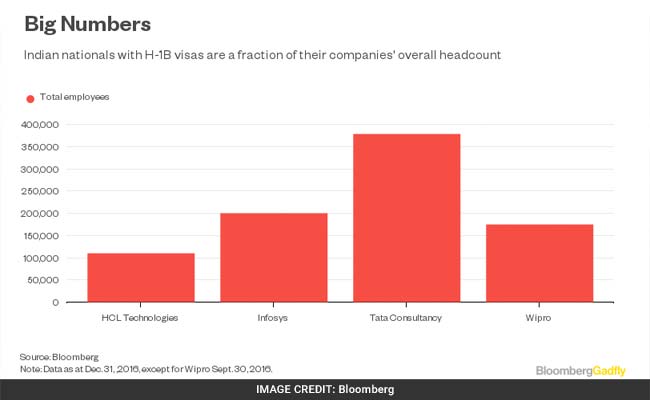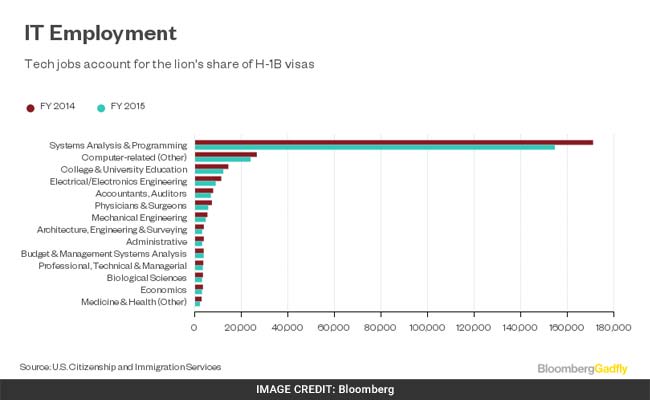A click through to the April 3 statement outlines steps the agency will take to clamp down on the use of temporary visas for foreign workers in specialty occupations.
Among the areas of focus: "Employers petitioning for H-1B workers who work off-site at another company or organization's location."
Indian technology companies are in the cross hairs. Outsourcing providers such as Tata Consultancy Services Ltd., Infosys Ltd. and Wipro Ltd. are contracted by U.S. firms and government agencies to deploy programmers and engineers. This usually happens at the client's premises instead of their own offices: that is, "offsite."
Indian nationals are so dominant in the H-1B program that they accounted for 195,247, or 70.1 percent, of all beneficiaries in 2015.

Outsourcing providers such as Tata Consultancy Services, Infosys and Wipro are contracted by US firms.
70.1%
Whatever the impact on these outsourcing companies, the crackdown is already hurting the net worth of their billionaire founders as investors anticipate tightened enforcement will hurt earnings, Bloomberg News reported Wednesday. Tata Consultancy has lost about 3 percent since the U.S. administration announced on March 3 it would suspend premium processing of H-1B visas, lagging a 2.8 percent advance in the benchmark Sensex index.
That needn't be the case.
Indian IT outsourcing companies got their start in the late 1990s amid growing concern that the year 2000 would render computer systems inert. Known as the millennium bug, the theory was that software would fail when the last two digits in a system's clocks went from 99 to 00.
U.S. organizations needed help going through millions of lines of code to ensure they'd survive the deadly countdown, and Indian companies with thousands of software technicians in cities like Bangalore were there to help. Once that relationship had been forged, it was only natural for U.S. companies to extend their reliance as CEOs discovered how easy it was to offshore mundane tasks to cheaper yet brilliant Indian teams.

US companies are supposed to use H-1Bs to hire talent they couldn't find locally.
India's IT sector employs around 4 million people. That makes the almost 200,000 Indians on H1-B visas a drop in the ocean. While there's a lot to be said for having staff at a client's office, so much more is being done back home.
Not being able to deploy directly would be an annoyance, but it shouldn't cripple their businesses. Instead, if the Indian government offers incentives to local and foreign firms to base more of their IT engineers in the country -- such as tax breaks, faster visa issuance for foreigners and reduced red tape -- there's reason to believe it could spur a renaissance.
U.S. companies are supposed to use H-1Bs to hire talent they couldn't find locally. If they truly are reliant on hundreds of thousands of Indian specialists, then they'd have many reasons to set up teams in the country and send non-Indian staff there to help run operations.
By leveraging Trump's visa crackdown, Indian Prime Minister Narendra Modi could boost the nation's tech sector and create even more jobs at home.
This column does not necessarily reflect the opinion of Bloomberg LP and its owners.
(Except for the headline, this story has not been edited by NDTV staff and is published from a syndicated feed.)


